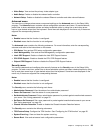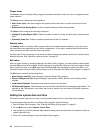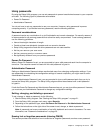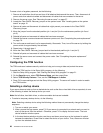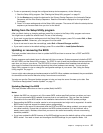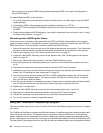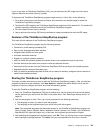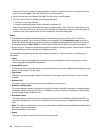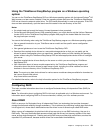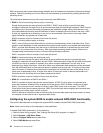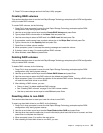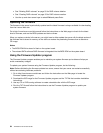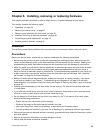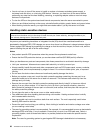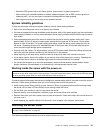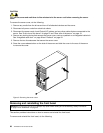
Using the ThinkServer EasyStartup program on a Windows operating
system
You can run the ThinkServer EasyStartup DVD on a Windows operating system with the Internet Explorer
®
6.0
Web browser or a later version installed. Enter the operating system and insert the ThinkServer EasyStartup
DVD into an internal or external optical drive. The DVD starts automatically in most environments. If the DVD
does not start automatically, open the launch.exe le located in the root directory of the DVD.
Notes:
• You should read and accept the Lenovo License Agreement when prompted.
• On the Microsoft Windows Server
®
2003 operating system, you might need to add the Uniform Resource
Locator (URL) for the ThinkServer EasyStartup program Web page to the trusted Web site list so that
the page can open correctly.
You can do the following when using the ThinkServer EasyStartup program on a Windows operating system.
• View a general introduction to your ThinkServer server model and the specic server conguration
information.
• View general guidance on how to use the ThinkServer EasyStartup DVD.
• Download the required device drivers to a removable storage device so that you can easily get the
drivers for server conguration when you need them, especially when you nish installing an operating
system without using the ThinkServer EasyStartup DVD and need appropriate device drivers to congure
your server.
• Install the required device drivers directly on the server on which you are running the ThinkServer
EasyStartup DVD.
• View information about all server models supported by the ThinkServer EasyStartup program and
information about the device drivers for each server model, including the driver versions and driver
locations in the root directory of the ThinkServer EasyStartup DVD.
Note: The most up-to-date device drivers for various server models are always available for download on
the Lenovo Support Web site at:
http://www.lenovo.com/drivers
For detailed information, refer to the help information system for the ThinkServer EasyStartup program.
Conguring RAID
This topic provides information about how to congure Redundant Array of Independent Disks (RAID) for
your server.
Note: The information about conguring RAID in this topic is applicable only in a Windows environment. For
information about conguring RAID in a Linux environment, contact your Linux software provider.
About RAID
RAID, an acronym for Redundant Array of Independent Disks, is a technology that provides increased
storage functions and reliability through redundancy. This is achieved by combining multiple hard disk drives
into a logical unit, where data is distributed across the drives in one of several ways called RAID levels.
When a group of independent physical hard disk drives are set up to use RAID technology, they are in a
RAID array. This array distributes data across multiple hard disk drives, but the array appears to the host
server as one single storage unit. Creating and using RAID arrays provides high performance, such as the
expedited I/O performance, because several drives can be accessed simultaneously.
Chapter 5. Conguring the server 31



